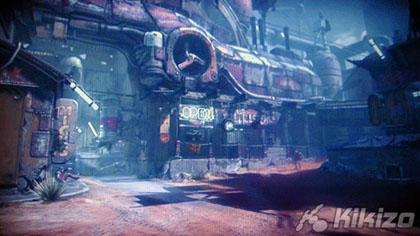Interview: id Software's Todd Hollenshead
We met id Software's CEO for an in-depth chat about Rage, the astonishing id Tech 5 engine and what it means to the games industry at large. Plus: comments on gaming for the Mac, Steam, Epic, Romero and what the future holds.
Page 2
Kikizo: The Doom 3 engine [id Tech 4] was underused as a licensable technology. So other than id Tech 5 looking fantastic, what will be the other reasons to use it?
Todd: Well there are a number of reasons. When you talk about next generation technology, I think the first thing that everybody thinks of is what they see. So that's natural - does it look good, do you have good performance, can you do amazing things visually. Because it's a technology-driven industry, and I think people who say it's not a technology-driven industry don't know what industry that they're in, and they probably won't be here for very long - we've seen those people come and go over the years, when they say we're at the apex of technology and something else is going to take over. And I really do think those people are wrong. I think that there's a long ways for technology to go to continue to drive innovation and change within the business, and I think that happens on the hardware side, and on the software side as well, and certainly that has been one of the core things that has been key to id's success.
So you start with visuals, but there are other things as well. From a visual standpoint you can do the exact same thing on id Tech 5 across platforms; you have the PC here and the PS3 here, and the reason you don't see any changes is the art is identical; we don't have a PC art team, a 360 art team and a PS3 art team; we don't have two guys to take the PC art and crunch it down to make it work on consoles. It's the identical media that works across all platforms, and that allows us as a small team to develop it on four platforms simultaneously without really incremental cost to do so.
Just using id as an example because I know us better than anyone else, Quake Wars was a multiplatform game as well; we had Splash Damage who's on a completely different time zone in the UK working on the PC, Nerve working on the 360 version in Dallas, which is convenient, but then Activision Foster City working on the PS3 version in California - we're spending millions of dollars on doing additional versions, and just the management hassle of trying to do all that, if you're not pulling out your hair it's going grey as you try to manage all of that - to avoid that hassle factor is huge.
Probably the next core thing as a consideration of technology licensing is, what is the reputation of the developer, what is their track record? And probably in that respect it is unparalleled. I mean there isn't a guy in the industry that I can think of who's better than John Carmack. When you look at the success and the track record of our licensees in the past - games like Half-Life, Medal of Honor, Call of Duty - I would rather have those three games as licensees than thirty games that nobody remembers. And probably the final important thing is that, distinct from the past, in which id licensees have had to work with tools that are probably not as robust as tools provided by other competitive rendering engines, is that now, because our company has grown, we've been able to have a guy specifically working tools, and we have a guy who's specifically dedicated to supporting our engine licensees. And the tools are very intuitive, very powerful, and they are created how artists and designers think, not how programmers think. So it is really a whole different paradigm in terms of making development as pain free as possible to allow people to get up and running with the technology as fast as possible, and minimise the sort of wheel spinning that goes on at the start while learning new things.
Kikizo: For all its output, id is actually a small development outfit right?
Todd: Compared to the rest of the industry we're actually quite small. For what you see here, there are about 33 people in development staff and not even all of them are working full time on Rage. We have four platforms at Alpha level on the technology all up and running at effectively 60hz.
Kikizo: Is this environment we're seeing reflective of an actual game level that we'll see in Rage?
Matt Hooper: Absolutely. This is actually the race track that we use in our internal 'Rage Cup' back at the office. It's one of the first race tracks in the game. We actually compete until midnight on a regular basis. [laughs]
Todd: Not only are all these assets from the game, but this is not running on a programmer box, where you take all the things that trouble you and that don't work right, and magically wave them away. This is actual production content. One of the cool things with the Megatexture technology is that you can have this fast environment, outdoor area - Enemy Territory Quake Wars is big [on detail], but the biggest stuff we can do in id Tech 5 is about eight times that - and this [environment shown in Rage] is only about a quarter of our 'capacity'. You can go zoom down and see where artists put drops of oil in the dirt as the cars went over, or they can go carve a tiny message into the back of a rock.
Kikizo: Even on the console builds we're looking at, it's still really early and yet it's running at a pretty stable 60fps.
Matt: That's not an accident, that's very much a conscious effort, and it comes from John Carmack on the technology side. Usually we're pushing the envelope so much that by the end of the project that's when the technology is ready. But right now having it run close to 60fps on all of the platforms, that's a big deal. We're pretty focussed on that, it's a key thing.








 Satoru Iwata Video Interview - the late Nintendo president spoke with Kikizo in 2004 as 'Nintendo Revolution' loomed.
Satoru Iwata Video Interview - the late Nintendo president spoke with Kikizo in 2004 as 'Nintendo Revolution' loomed. Kaz Hirai Video Interview - the first of Kikizo's interviews with the man who went on to become global head of Sony.
Kaz Hirai Video Interview - the first of Kikizo's interviews with the man who went on to become global head of Sony. Ed Fries Video Interview - one of Xbox's founders discusses an epic journey from Excel to Xbox.
Ed Fries Video Interview - one of Xbox's founders discusses an epic journey from Excel to Xbox. Yu Suzuki, the Kikizo Interview - we spend time with one of gaming's most revered creators.
Yu Suzuki, the Kikizo Interview - we spend time with one of gaming's most revered creators. Tetris - The Making of an Icon: Alexey Pajitnov and Henk Rogers reveal the fascinating story behind Tetris
Tetris - The Making of an Icon: Alexey Pajitnov and Henk Rogers reveal the fascinating story behind Tetris Rare founders, Chris and Tim Stamper - their only interview? Genuinely 'rare' sit down with founders of the legendary studio.
Rare founders, Chris and Tim Stamper - their only interview? Genuinely 'rare' sit down with founders of the legendary studio. The History of First-Person Shooters - a retrospective, from Maze War to Modern Warfare
The History of First-Person Shooters - a retrospective, from Maze War to Modern Warfare